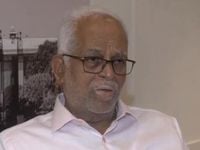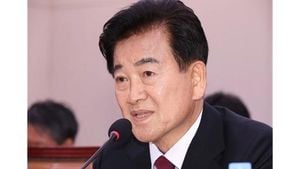India’s Parliament is no stranger to heated debates, passionate protests, and the occasional walkout. But the Monsoon session of 2025 brought a level of discord and drama that left even seasoned lawmakers with sore throats—literally, in the case of Parliamentary Affairs Minister Kiren Rijiju. As the country gears up for a pivotal Vice Presidential election, the political climate in New Delhi has grown tense, with accusations, counter-accusations, and calls for civility echoing through the hallowed halls of power.
On August 23, 2025, Kiren Rijiju made headlines when he claimed his throat had become sore from repeatedly urging opposition MPs to allow Parliament to function smoothly. “In a parliamentary democracy, the Parliament belongs to the Opposition. The government is liable to answer. The Opposition has to ask questions. What would the government do if the ones who are supposed to ask questions ran away?” Rijiju told reporters, frustration evident in his voice, as quoted by The Times of India. He went on to describe his efforts: “We have been asking them not to cause a disturbance. My throat got sore because I had to shout and ask the Opposition not to create a ruckus.”
His comments highlight a session marked by repeated clashes. The opposition, led by the I.N.D.I.A bloc, was relentless in its protests, both inside and outside Parliament. Their primary grievance centered on the ongoing revision of electoral rolls, which they described as “vote theft” and “silent invisible rigging.” Senior leaders including Congress chief Mallikarjun Kharge, Rahul Gandhi, Priyanka Gandhi Vadra, Samajwadi Party leader Akhilesh Yadav, Trinamool Congress MP Mahua Moitra, and Aam Aadmi Party MP Sanjay Singh were at the forefront of these demonstrations, wielding banners that read “Stop vote chori.”
The ruling party, for its part, accused the opposition of deliberately disrupting proceedings, a charge that found support in the numbers. According to Lok Sabha Speaker Om Birla, the lower house managed only 37 hours of work during the session, while the Rajya Sabha fared little better at 41 hours. For a legislature tasked with passing crucial bills and debating national issues, these figures were sobering.
As the dust from the Monsoon session settled, attention shifted to the upcoming Vice Presidential election, scheduled for September 9, 2025. The stakes are high, not just because of the office itself, but because of the symbolic battle it represents between the ruling National Democratic Alliance (NDA) and the opposition I.N.D.I.A bloc. The opposition’s candidate, B. Sudarshan Reddy—a former Supreme Court judge—finds himself at the center of a political storm.
Reddy’s nomination was a collective decision by the I.N.D.I.A bloc, as he explained in an interview with ANI: “Some senior Congress leaders proposed my name. Initially, I expressed reservations about being a candidate of a particular party. But when the I.N.D.I.A bloc collectively endorsed me, I agreed to contest.” On August 21, he filed his nomination in the presence of Congress President Mallikarjun Kharge, Congress Parliamentary Party Chairperson Sonia Gandhi, and Leader of Opposition in the Lok Sabha Rahul Gandhi, as reported by Bhaskar English. The show of unity was unmistakable, with senior alliance leaders like NCP (SCP) chief Sharad Pawar, Samajwadi Party MP Ram Gopal Yadav, DMK MP Tiruchi Siva, and Shiv Sena (UBT) MP Sanjay Raut also standing by his side.
Yet, the campaign has been anything but smooth. Union Home Minister Amit Shah accused Reddy of being a Naxal sympathiser, citing a judgment he delivered related to left-wing extremism and Naxalism. Shah argued that “without the verdict against Salwa Judum, the menace would have ended by 2020.” The charge is a serious one in Indian politics, where the shadow of Naxalism looms large over public discourse. Reddy, for his part, has called for a dignified and civilised contest, urging all sides to refrain from personal attacks. “No personal attacks on anyone,” he insisted, hoping to elevate the tone of the campaign amid the mudslinging.
The numbers, however, seem stacked against Reddy. In the 542-member Lok Sabha (with one seat vacant), the NDA commands the support of 293 MPs. In the Rajya Sabha, which currently has 245 MPs and five vacancies, the NDA boasts 129 members. If nominated members also vote with the NDA, the ruling coalition will have the backing of 422 MPs—well above the 391 required for a majority. The arithmetic makes the NDA candidate, C.P. Radhakrishnan, the odds-on favorite. For the opposition, the contest is more about sending a message than securing a win.
History, too, offers little comfort to the opposition. In the last Vice Presidential election held in August 2022, NDA candidate Jagdeep Dhankhar swept to victory with 528 votes, while the opposition’s Margaret Alva managed just 182. Notably, 56 MPs abstained from voting—a reminder of the shifting loyalties and strategic calculations that often influence outcomes in Indian parliamentary elections.
Despite the daunting numbers, the opposition is determined to fight on. Their campaign is as much about highlighting what they see as the government’s failures—on issues ranging from electoral transparency to civil liberties—as it is about contesting the Vice Presidency. The Monsoon session’s protests over the electoral roll revision were a case in point. The opposition’s banners and speeches accused the Election Commission of facilitating “silent invisible rigging,” a charge the government has vigorously denied.
For the ruling party, the opposition’s tactics amount to obstructionism. Rijiju’s lament about his sore throat was laced with exasperation and a touch of irony. “With folded hands, we have requested the Congress party to participate in the discussion. There are many members of Congress who can speak well and are also knowledgeable. They will face issues if I name anyone... If Rahul Gandhi cannot speak or he does not know how to speak, that does not mean that others should also not be allowed to speak,” he said, a not-so-subtle jab at the Congress scion’s parliamentary performance.
As September 9 approaches, all eyes will be on the Vice Presidential election—a contest whose outcome may be a foregone conclusion, but whose conduct and rhetoric will be closely watched. Reddy’s plea for civility, Shah’s sharp criticisms, and Rijiju’s calls for order all reflect the deep divisions and high stakes of Indian politics today. Whether Parliament can return to a more productive and respectful mode of functioning remains an open question, but one thing is clear: the battle for India’s democratic soul is far from over.
In the weeks ahead, as MPs cast their votes and the nation looks on, the hope is that the spirit of debate, dissent, and democracy will prevail—however rough the road may be.




